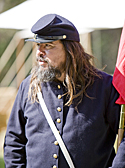 In the midst of the raging Civil War, a well-known poet by the name of Julia Ward Howe, attended a public review of the troops in Washington D.C. She heard the soldiers singing a familiar tune, “John Brown Song.” The tune was catchy and perfect to be sung by the troops, but she was not impressed with the words. Some of her accompanying friends encouraged her to write new words for the song. As she lay on her bed that night, the words came to her mind. She quickly climbed out of bed and hurriedly penned the words of “The Battle Hymn of the Republic,” before they left her.
In the midst of the raging Civil War, a well-known poet by the name of Julia Ward Howe, attended a public review of the troops in Washington D.C. She heard the soldiers singing a familiar tune, “John Brown Song.” The tune was catchy and perfect to be sung by the troops, but she was not impressed with the words. Some of her accompanying friends encouraged her to write new words for the song. As she lay on her bed that night, the words came to her mind. She quickly climbed out of bed and hurriedly penned the words of “The Battle Hymn of the Republic,” before they left her.
“The Battle Hymn of the Republic” was then printed in the Atlantic Monthly. The song soon spread to the army camps, where troops started singing the new words to the old tune they knew so well.
One man who read the words was Chaplain McCabe. He was so impressed with the words that he memorized them. Not long after that he was imprisoned along with many other Union soldiers. Gloom descended upon the men as day after terrible day passed.
One evening they received the disheartening news that the Union army had just sustained a major defeat in battle. As they sat with heavy hearts, the slave that waited on them, relayed in whispered tones that the news had been false. The Union army had gained the victory, not defeat! As the news quickly spread amidst great joy and ecstasy, Chaplain McCabe began to sing the words to the “Battle Hymn,” that he had so recently learned. What a joyous night that was, for it was the victory of Gettysburg.
Sing It Again
Not long after, Chaplain McCabe was released and traveled to Washington, D.C. He gave a lecture, telling of his many experiences in the war, including that memorable night in prison. He ended his speech by singing the great and majestic “Battle Hymn of the Republic.” People wept as his powerful voice swept over the audience. And then, as the song died away, the tear-filled voice of our beloved President Abraham Lincoln, called out, “Sing it again!” 1
No doubt, as our world marches down to the close of earth’s history, many fear the end of it all. What will become of our country? We know we sit in one of the most significant times in history. But as I ponder these things, my thoughts go back to that song, written long ago amidst the raging battles of the Civil War…
“Mine eyes have seen the glory of the coming of the Lord;
He is trampling out the vintage where the grapes of wrath are stored;
He hath loosed the fateful lightning of His terrible swift sword:
His truth is marching on.” 2
We can know for a certainty that God’s truth is marching on. Facing the end of time can cause us fear, but instead of being afraid, we should memorize the promises in the Bible, like Chaplain McCabe memorized that song, and claim them with assurance. In John 14:1-3 it says, “Let not your heart be troubled; you believe in God, believe also in Me. In My Father’s house are many mansions; if it were not so, I would have told you. I go to prepare a place for you. And if I go and prepare a place for you, I will come again and receive you to Myself; that where I am, there you may be also.” What sweet assurance!




